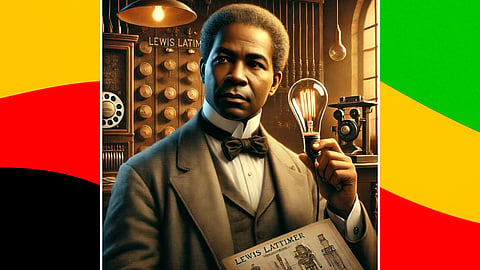
- Home
- About Us
- SOULIVITY TODAY Radio Show!
- COMMUNITY HUB
- GO SHOP by Soulivity!
- ColumnsColumns
- CultureCulture
- Lifestyle
- Contact Us!

When we think about the invention of the light bulb, Thomas Edison’s name often comes to mind. Similarly, when discussing the telephone, Alexander Graham Bell is credited as the primary innovator. However, few know that an African American inventor named Lewis Howard Latimer played a crucial role in both breakthroughs. His genius not only improved these technologies but also laid the foundation for modern electrical innovation.
Born on September 4, 1848, in Chelsea, Massachusetts, Latimer was the son of fugitive slaves who had escaped from Virginia. Despite his modest upbringing, he displayed a remarkable talent for mechanical drawing and engineering. At the age of 15, he joined the U.S. Navy to serve in the Civil War. After his service, he secured a position as an office boy at a patent law firm, where he quickly taught himself technical drawing. His skill caught the attention of his employers, and he was promoted to draftsman—a rare accomplishment for an African American in that era.
In 1881, Thomas Edison’s light bulb was groundbreaking but flawed. It relied on a paper filament that burned out quickly, making it inefficient for widespread use. Latimer, who was working for Hiram Maxim’s U.S. Electric Lighting Company at the time, developed a carbon filament that lasted much longer, making electric lighting more practical and affordable. His work was instrumental in making electric lighting commercially viable, yet Edison received most of the recognition.
Before his work with the light bulb, Latimer was involved in another historic innovation—the telephone. In 1876, while working for a patent firm, he was assigned to draft the blueprints for Alexander Graham Bell’s telephone patent. Bell himself credited Latimer’s precision and expertise as crucial in securing his patent before competitors could challenge it.
Beyond his inventions, Latimer was a passionate advocate for African American rights and education. He was one of the first Black members of the prestigious Edison Pioneers, a group of inventors who worked closely with Edison. He also wrote a technical book, "Incandescent Electric Lighting: A Practical Description of the Edison System," in 1890, making electrical knowledge more accessible. Additionally, he mentored young Black engineers, believing that education and perseverance were keys to breaking racial barriers.
Despite his monumental contributions, Latimer’s name is rarely mentioned alongside Edison and Bell. His story serves as a reminder of the countless African American inventors whose brilliance shaped the modern world but whose recognition remains unjustly overshadowed. As we celebrate Black History Month, it is vital to honor figures like Lewis Latimer, who not only contributed to technological progress but also paved the way for future generations of Black engineers and scientists.
Lewis Latimer’s genius illuminated homes and transformed communication, yet history largely forgets his name. His resilience, intellect, and dedication to innovation make him an unsung hero worth remembering. This Black History Month, let’s shine a light on his legacy and ensure that future generations recognize his invaluable contributions to the world.
